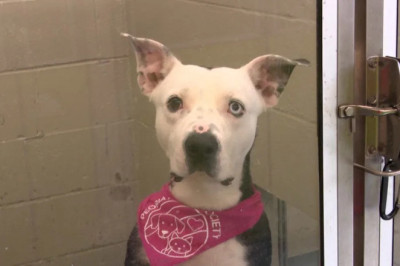
views
5 Signs Your French Bulldog Is Mean (And What to Do About It)
French Bulldogs are famous for their friendly and affectionate nature, making them a popular choice for families and individuals alike. However, like any breed, they can exhibit behavioral issues that might come across as mean or aggressive. Understanding these signs and knowing how to address them is crucial for ensuring a harmonious relationship with your Frenchie. In this article, we'll explore five signs that your French Bulldog might be displaying mean behavior and provide practical tips on how to manage it.
1. Growling and Snapping
What It Means:
Growling and snapping are clear signs that your French Bulldog is feeling threatened or uncomfortable. This behavior can be alarming, especially if it's directed towards people or other pets.
Why It Happens:
Growling and snapping often occur when a dog feels cornered or anxious. It can be a reaction to unfamiliar situations, perceived threats, or even pain. For French Bulldogs, who are known for their protective nature, this behavior might be more pronounced when they feel their territory or loved ones are at risk.
What to Do:
-
Identify Triggers: Observe the situations that lead to growling and snapping. Is it during mealtime, when strangers approach, or around other animals? Identifying triggers is the first step in addressing the behavior.
-
Create a Safe Space: Ensure your Frenchie has a designated safe space where they can retreat and feel secure. This can help reduce their anxiety and aggression.
-
Positive Reinforcement: Reward calm and non-aggressive behavior with treats and praise. Gradually expose them to their triggers in a controlled and positive manner to build their confidence.
2. Resource Guarding
What It Means:
Resource guarding occurs when a dog becomes possessive over food, toys, or other valuable items. Your French Bulldog might growl, snap, or even bite if they feel their possessions are being threatened.
Why It Happens:
Resource guarding is a natural instinct for many dogs, stemming from their evolutionary need to protect their resources. In French Bulldogs, this behavior can be exacerbated by past experiences or a lack of proper training.
What to Do:
-
Avoid Punishment: Punishing your Frenchie for guarding can increase their anxiety and worsen the behavior. Instead, use positive reinforcement techniques to build trust.
-
Trade-Up Technique: Teach your dog that giving up their prized possessions leads to better rewards. For example, trade a toy they are guarding for a high-value treat.
-
Manage Access: During training, manage your dog's access to resources by feeding them in a separate area and removing toys when not in use.
3. Aggression Towards Other Dogs
What It Means:
If your French Bulldog is displaying aggressive behavior towards other dogs, such as barking, lunging, or biting, it's a sign that they are feeling threatened or territorial.
Why It Happens:
French Bulldogs can be protective and may feel the need to assert dominance over other dogs. Lack of socialization or negative past experiences with other dogs can contribute to this behavior.
What to Do:
-
Early Socialization: Socialize your Frenchie from a young age by exposing them to various dogs in a controlled and positive environment. Puppy classes and playdates can be beneficial.
-
Leash Training: Practice leash training to ensure your dog remains calm and controlled during walks. Reward them for calm behavior around other dogs.
-
Seek Professional Help: If the aggression is severe, consider consulting a professional dog trainer or behaviorist for personalized guidance.
4. Excessive Barking
What It Means:
Excessive barking can be a sign of various issues, including boredom, anxiety, or territorial behavior. It's important to address the underlying cause to manage this behavior effectively.
Why It Happens:
French Bulldogs may bark excessively if they are left alone for long periods, feel threatened by strangers or other animals, or are seeking attention.
What to Do:
-
Provide Enrichment: Ensure your Frenchie has plenty of mental and physical stimulation through toys, puzzles, and regular exercise. A tired dog is less likely to bark excessively.
-
Training Commands: Teach your dog the "quiet" command using positive reinforcement. Reward them for stopping barking on command.
-
Address Separation Anxiety: If your Frenchie barks excessively when left alone, work on gradually desensitizing them to your departures and providing comfort items, such as a favorite blanket or toy.
5. Biting
What It Means:
Biting is a serious behavior that can indicate fear, aggression, or a lack of proper training. It's crucial to address biting promptly to prevent injury and ensure safety.
Why It Happens:
French Bulldogs may bite if they feel cornered, scared, or if they haven't been taught bite inhibition. Puppies may also bite during teething or play.
What to Do:
-
Early Training: Teach your Frenchie bite inhibition from a young age by redirecting their biting to appropriate chew toys and using positive reinforcement.
-
Avoid Rough Play: Avoid rough play that can encourage biting. Opt for gentle play and positive interactions.
-
Seek Professional Help: If your adult Frenchie is biting aggressively, consult a professional behaviorist to develop a comprehensive training plan.
Conclusion
While French Bulldogs are generally known for their friendly and affectionate nature, they can display mean or aggressive behavior under certain circumstances. By understanding the signs of mean behavior and implementing positive reinforcement training, socialization, and providing a safe environment, you can help your Frenchie become a well-behaved and loving companion. Remember, patience and consistency are key to addressing behavioral issues and building a strong bond with your furry friend.





















Comments
0 comment